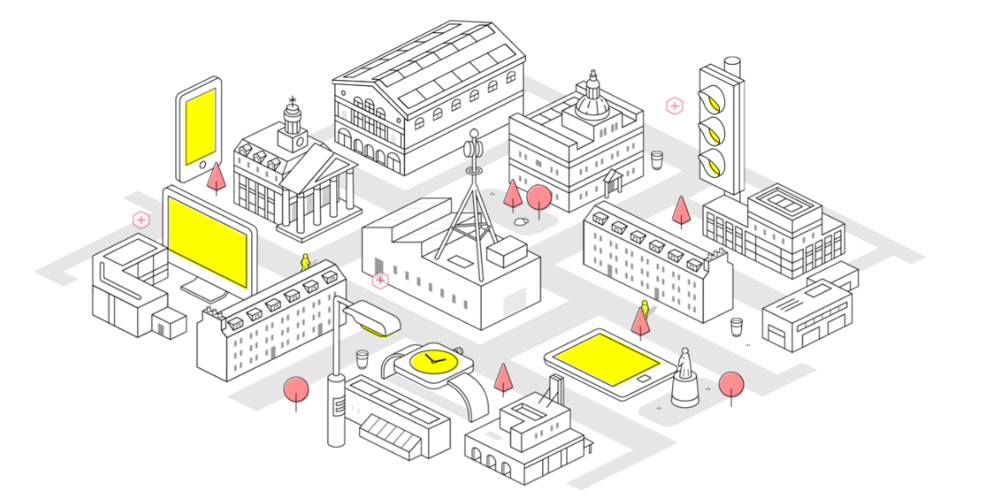In 2013, Glasgow beat 50 other UK cities to win funding worth £24m from Innovate UK to explore innovative ways to use technology and data to make life in the city safer, smarter and more sustainable.

A couple of weeks ago we wrote about our work in the Glasgow City Centre Regeneration Frameworks Master Planning Project.
One of the aspects of our work is contributing to the project by supporting and highlighting the emerging smart cities standards and trends, gathering international smart cities examples and best practices and capturing existing smart cities projects within the city - both planned and in development. In the post you can read about how we intend to support and ensure that Glasgow realises the benefits from the ‘network effect’ as data, technology and people are joined together.
“The smart city can be defined as the integration of data and digital technologies into a strategic approach to sustainability, citizen well-being and economic development.”
— Scottish Government, 2014
Smart cities adopt a ‘system-of-systems’ approach to service delivery and develop collaborative service models to focus on shared outcomes across organisational boundaries. Smart cities make best use of data and digital technologies to invest in enhanced openness and transparency that promote citizen and business engagement in, and ownership of, service reform.
The prospect is of cities and their regions using data and digital technologies to manage urban congestion, maximise energy efficiency through smart grid technology, enhance public security and resilience, allocate scarce resources based on real-time evidence and turn operational data into insight, information and knowledge.
The smart cities concept is based on replicating this data process across multiple systems delivering exponentially greater benefits with fuller deployment across all service areas.
Glasgow’s Smart City Journey So Far

In 2013, Glasgow beat 50 other UK cities to win funding worth £24m from Innovate UK to explore innovative ways to use technology and data to make life in the city safer, smarter and more sustainable.
Over 18 months, Glasgow’s Future Cities Demonstrator developed a series of initiatives to showcase the exciting potential offered by smart city technology.
OPEN Glasgow
Cities and their citizens generate a huge amount of data that can be used in smart ways to achieve great things. Stepping boldly into the future, Glasgow developed an OPEN Data platform that allows the city and organisations to automate the publication of their data, allowing the data to be stored and making it available on a large scale so that it is easy to access data.glasgow.gov.uk; it helps make the publication of open data sustainable for everyone in the city and helps us to understand and shape Glasgow in new and surprising ways.
Glasgow Operations Centre
The Glasgow Operations Centre is a state-of-the-art, integrated traffic and public safety management system created with the help of Future City funding. By bringing together public CCTV, Glasgow Community Safety Services, Traffic Management Services and the Resilience and Safety Team, this centralised hub can assess and respond to situations large and small across the city. It also helped facilitate and safeguard the Glasgow 2014 Commonwealth Games.
Four Demonstrators to Help Show the Way
The Intelligent Street Lighting Demonstrator showed how the city can use smarter streetlights to improve lighting quality, reduce energy usage and make maintenance more efficient. The pilot scheme also collected useful data that could have a positive impact on the quality of life and public safety in the two test locations: Riverside Walkway and Gordon Street. Useful data collected was on noise detection, movement detection, air pollution detection and WiFi service.
The Active Travel Demonstrator showed how the city can be made friendlier for both cyclists and pedestrians and had the potential to inform strategies that could help Glasgow reach the Scottish Government's target of 10% of all journeys being completed by bike.
The Energy Efficiency Demonstrator showed how obtaining increasingly accurate information could help inspire ways to cut emissions, reduce overheads and address issues of fuel poverty. By creating a detailed, data-rich portrait of Glasgow’s consumption, it became possible to identify and act upon factors that change energy behaviours.
The Integrated Social Transport Demonstrator helped some of Glasgow’s most vulnerable citizens access social and educational services. Smart integration and route scheduling software will increase flexibility and responsiveness while also reducing operational costs and making it easier for the same transport to be used across various organisations.
How Smart Can Glasgow Be?
What are the opportunities?
The Future City Glasgow programme has provided a strong platform for Glasgow; it is already unlocking new projects and funding opportunities. We want to ensure that the significant benefits can be realised from the ‘network effect’ as data, technology and people are joined together. This exponentially magnifies the potential benefits, impact and value that can be delivered.
During the next stages of the (Y)our City Centre Project we will use our Smart Cities Maturity Model and Self-Assessment Tool to help identify and understand what smart projects are planned, commenced or an aspiration for the city centre districts.
The Smart Cities Maturity Model and Self-Assessment Tool draw on and adapt existing models and frameworks in this field and were developed with the Scottish Government and Scottish Cities Alliance to use with all seven Scottish cities. The Smart City Maturity Model and Self-Assessment Tool help cities understand their position on the journey towards ‘smart’ and are designed to walk cities through the process of clearly understanding current activity, identifying next steps and gaining an appreciation of the actions and resources required to realise their ambitions. Furthermore, the Smart City Maturity Model and Self-Assessment Tool support the development of business cases to unlock investment and resources required to realise and take advantage of the opportunities delivered by a ‘system-of-systems’ smart city approach.
Investment in digital technologies and improved data management alone will not deliver the smart city. Over time, cities need to consider the strategic intent, governance and service delivery models that exist together with their approaches to citizen and business engagement if they are to secure the maximum impact from their investments. The ultimate vision is of a smart city that strategically manages multiple systems at a city-wide level and through increased transparency, openness and shared accountability to create an innovation system that improves outcomes and enhances city competitiveness.






